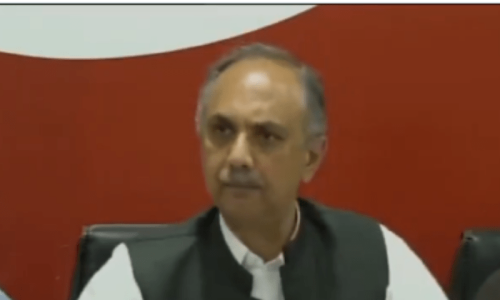ISLAMABAD, Nov 13: General David McKiernan, the Commander of International Security Assistance Force (Isaf) in Afghanistan, has distanced himself from drone attacks in Pakistan’s tribal areas and vowed to maintain pressure on militants during winter.
According to sources, the allied forces’ commander, during a briefing to a select group of parliamentarians at the residence of US Ambassador Anne W. Patterson on Thursday, said he had nothing to do with the missile attacks being carried out by drones. “I cannot speak on this issue as these drones do not come under my command.”
The briefing was attended by Pakistan Muslim League-N’s Tehmina Daultana, Sheikh Aftab Ahmed, Ayaz Amir, Rohail Asghar and Umair Hayat, Muttahida Qaumi Movement’s Haider Abbas Rizvi, Pakistan People’s Party’s Nabil Gabol, Dr Firdous Ashiq Awan, Palwasha Behram and Farah Naz, PML-Q’s S.M. Zafar and Dilawar Abbas and a lawmaker of the National People’s Party.
The US general said his forces had chalked out a plan to “maintain pressure” on militants during winter, adding: “Pakistan and Afghanistan are suffering from instability.”
He appreciated the role of the tripartite commission comprising Pakistan, Afghanistan and Isaf. The US commander praised army chief Gen Ashfaq Parvez Kayani and said he had a “good understanding” with him.
In reply to a question about withdrawal of US-led forces from Afghanistan, Gen McKiernan said: “It is up to the political leadership to decide.”
He said that there was a strong nexus between the Taliban, Al Qaeda, drug mafia and foreign fighters.
He made a presentation by using slides on a projector. According to the sources, the Isaf commander had specially flown to Islamabad for the briefing.
JI BOYCOTT: The briefing, arranged by the US embassy without involving the Pakistan’s Foreign Office and military authorities, drew criticism from religious parties. Jamaat-i-Islami’s Senator Prof Khurshid Ahmed, who was also invited to the briefing, boycotted it. He termed it against “the best traditions of diplomatic and political dialogue”.
Leader of the House in the Senate, Raza Rabbani, also criticised the US embassy on the floor of the house and said it had bypassed the Foreign Office in arranging the briefing. He expressed the hope that the FO would take up the matter at an appropriate forum.
Senator Khurshid informed the US ambassador about his decision to boycott the briefing through a letter. “It would not be possible for me to attend this programme not only because the notice is too short, but also because I feel uncomfortable about a Nato commander briefing the parliamentarians at the residence of the US ambassador.
“While discourse and discussions are always useful in developing better understanding of issues which are controversial, efforts like this smack of lobbying and are not in keeping with the best traditions of diplomatic engagement and political dialogue,” the JI senator wrote.“I wish Nato had contacted Pakistan Foreign Office to arrange for any briefing on this issue, provided the government of Pakistan also felt such a need. If the parliament had felt such a need it could have taken initiative in this respect. The viewpoint of the parliament on this issue has been clearly articulated in the 14-point unanimous resolution passed by the joint session on Oct 22, 2008,” he said.
It is not clear what exactly prompted the US commander to visit Islamabad for the briefing, but it is believed that the language of the resolution adopted unanimously at the in-camera joint sitting of parliament last month has impelled the US general to explain Nato’s position on the drone and missile attacks.
The resolution called for an “urgent review of national security strategy and revisiting the methodology of combating terrorism in order to restore peace and stability in Pakistan and the region through an independent foreign policy”.
It also called for establishing the writ of the state in the troubled zones and initiating confidence-building mechanisms by using customary and local communities (jirga). The resolution said the military would be replaced as early as possible by civilian law-enforcement agencies with enhanced capacity and a sustainable political system achieved through a consultative process.
















































Dear visitor, the comments section is undergoing an overhaul and will return soon.